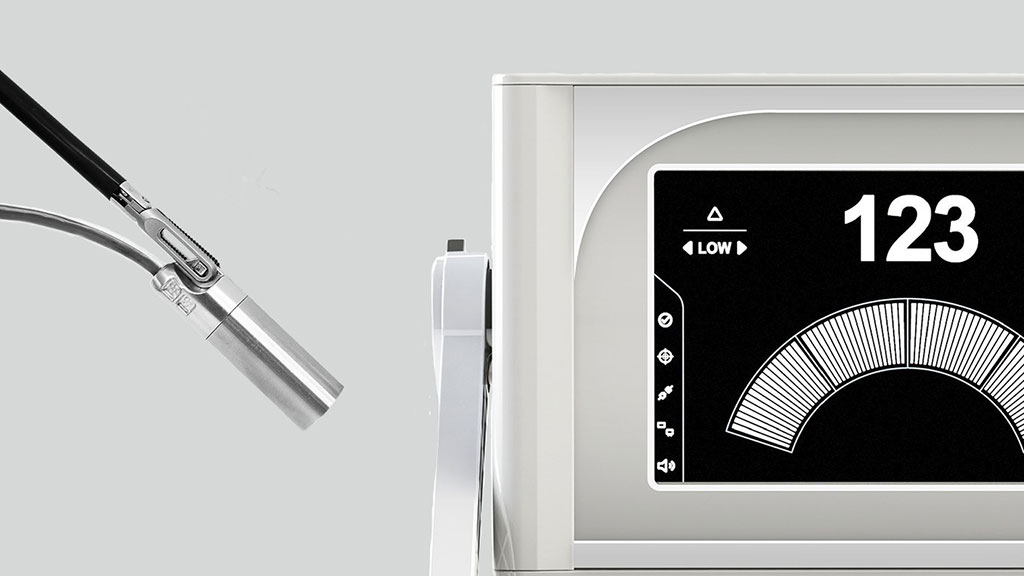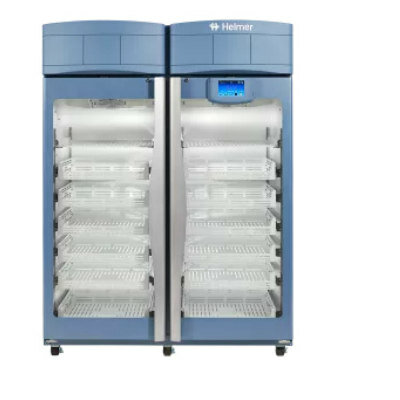Miniature Robotic Gamma Probe Enables Unprecendented Dexterity and Anatomic Reach in Minimally Invasive Surgeries
|
By HospiMedica International staff writers Posted on 05 May 2023 |

Robotic technology has revolutionized surgical procedures over recent decades, with robot-assisted, minimally invasive cancer surgeries becoming the norm. Yet, despite these advancements, surgical procedures can leave traces of cancer behind, or alternatively, remove healthy tissue unnecessarily. This necessitates additional treatments like drug therapy, radiotherapy, and further surgeries. Now, a new miniature surgical probe can help surgeons quickly and accurately detect cancer in real-time in more difficult-to-access areas, enhancing surgical precision, improving patient outcomes, and reducing healthcare costs.
Lightpoint Medical’s (Buckinghamshire, UK) SENSEI is a compact gamma probe designed to dramatically expand the scope of radio-guided cancer surgery. Barely larger than an AA battery and specifically crafted for robotic and minimally invasive surgery, SENSEI facilitates radio-guided procedures in previously hard-to-reach surgical cavities like the pelvis, abdomen, and lungs. This makes the device versatile, applicable to a wide range of surgical procedures for major cancer types, including prostate, cervical, colorectal, lung, and bladder cancer.
SENSEI was designed in close cooperation with leading surgeons and nuclear medicine physicians. It's user-friendly in the operating room, providing clear audible and graphic displays. The single-use, disposable probe is just over 40mm long, making it suitable for both manual intracavity and robotic laparoscopic procedures. Connected to a 3-metre lightweight cable, the probe can be easily removed through a standard 12mm entry port. Paired with an articulating grasper, this mini probe allows unmatched intracavity maneuverability and dexterity. With multiple grip orientations, the probe can offer six degrees of freedom within the surgical field, reaching all areas of interest.
When used in conjunction with molecularly-targeted imaging agents, SENSEI can directly detect cancer during surgery. This aids surgeons in effectively removing cancerous tissue and sparing healthy, functional tissue. Additionally, the SENSEI system can be integrated with robotic surgical platforms, allowing visualization of the probe and radiation signal directly from the surgical console. With its wide-ranging applications in radio-guided surgery for various procedures and major cancer types, SENSEI is already being utilized globally in prostate, cervical, and colorectal cancer surgeries.
Related Links:
Lightpoint Medical

Latest Surgical Techniques News
- Pioneering Sutureless Coronary Bypass Technology to Eliminate Open-Chest Procedures
- Intravascular Imaging for Guiding Stent Implantation Ensures Safer Stenting Procedures
- World's First AI Surgical Guidance Platform Allows Surgeons to Measure Success in Real-Time
- AI-Generated Synthetic Scarred Hearts Aid Atrial Fibrillation Treatment
- New Class of Bioadhesives to Connect Human Tissues to Long-Term Medical Implants
- New Transcatheter Valve Found Safe and Effective for Treating Aortic Regurgitation
- Minimally Invasive Valve Repair Reduces Hospitalizations in Severe Tricuspid Regurgitation Patients
- Tiny Robotic Tools Powered by Magnetic Fields to Enable Minimally Invasive Brain Surgery
- Magnetic Tweezers Make Robotic Surgery Safer and More Precise
- AI-Powered Surgical Planning Tool Improves Pre-Op Planning
- Novel Sensing System Restores Missing Sense of Touch in Minimally Invasive Surgery
- Headset-Based AR Navigation System Improves EVD Placement
- Higher Electrode Density Improves Epilepsy Surgery by Pinpointing Where Seizures Begin
- Open-Source Tool Optimizes Placement of Visual Brain Implants
- Easy-To-Apply Gel Could Prevent Formation of Post-Surgical Abdominal Adhesions
- Groundbreaking Leadless Pacemaker to Prevent Invasive Surgeries for Children
Channels
Critical Care
view channel
Ingestible Smart Capsule for Chemical Sensing in the Gut Moves Closer to Market
Intestinal gases are associated with several health conditions, including colon cancer, irritable bowel syndrome, and inflammatory bowel disease, and they have the potential to serve as crucial biomarkers... Read moreNovel Cannula Delivery System Enables Targeted Delivery of Imaging Agents and Drugs
Multiphoton microscopy has become an invaluable tool in neuroscience, allowing researchers to observe brain activity in real time with high-resolution imaging. A crucial aspect of many multiphoton microscopy... Read more
Novel Intrabronchial Method Delivers Cell Therapies in Critically Ill Patients on External Lung Support
Until now, administering cell therapies to patients on extracorporeal membrane oxygenation (ECMO)—a life-support system typically used for severe lung failure—has been nearly impossible.... Read morePatient Care
view channel
Portable Biosensor Platform to Reduce Hospital-Acquired Infections
Approximately 4 million patients in the European Union acquire healthcare-associated infections (HAIs) or nosocomial infections each year, with around 37,000 deaths directly resulting from these infections,... Read moreFirst-Of-Its-Kind Portable Germicidal Light Technology Disinfects High-Touch Clinical Surfaces in Seconds
Reducing healthcare-acquired infections (HAIs) remains a pressing issue within global healthcare systems. In the United States alone, 1.7 million patients contract HAIs annually, leading to approximately... Read more
Surgical Capacity Optimization Solution Helps Hospitals Boost OR Utilization
An innovative solution has the capability to transform surgical capacity utilization by targeting the root cause of surgical block time inefficiencies. Fujitsu Limited’s (Tokyo, Japan) Surgical Capacity... Read more
Game-Changing Innovation in Surgical Instrument Sterilization Significantly Improves OR Throughput
A groundbreaking innovation enables hospitals to significantly improve instrument processing time and throughput in operating rooms (ORs) and sterile processing departments. Turbett Surgical, Inc.... Read moreHealth IT
view channel
Printable Molecule-Selective Nanoparticles Enable Mass Production of Wearable Biosensors
The future of medicine is likely to focus on the personalization of healthcare—understanding exactly what an individual requires and delivering the appropriate combination of nutrients, metabolites, and... Read more
Smartwatches Could Detect Congestive Heart Failure
Diagnosing congestive heart failure (CHF) typically requires expensive and time-consuming imaging techniques like echocardiography, also known as cardiac ultrasound. Previously, detecting CHF by analyzing... Read moreBusiness
view channel
Expanded Collaboration to Transform OR Technology Through AI and Automation
The expansion of an existing collaboration between three leading companies aims to develop artificial intelligence (AI)-driven solutions for smart operating rooms with sophisticated monitoring and automation.... Read more















